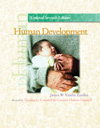 |  Human Development: Updated, 7/e James Vander Zanden,
Ohio State University
Thomas Crandell,
Broome Community College
Corinne Crandell,
Broome Community College
Early Childhood 2 to 6: Physical and Cognitive Development
Chapter OutlineChapters 4, 5, and 6 dealt with the period of infancy. Chapter 7 is the first of two chapters focusing on early childhood - the time between ages 2 and 6. During this period, children acquire autonomy, evolve new ways of relating to other people, and gain a sense of themselves and their effectiveness in the world. Several vital topics are examined, including:
1Physical Growth and Motor Skill Development. Underpinning cognitive and social skills are continued physical growth and the perfection of gross and fine motor skills that promote coordination of movement. The expansion of their physical world allows children the opportunity for affecting their environment. |
 |  |  | 2Cognitive Development. Various forms of intelligence are discussed, as is the nature-nurture controversy surrounding the level of an individual's intelligence. The early development of intelligence is traced in accordance with Piaget's observations. More recent research concerning children's conceptual foundations for learning is also presented. |
 |  |  | 3Information Processing and Memory. Early memory, information processing, metacognition, and metamemory are discussed in detail. The memory strategies of categorizing and rehearsing are illustrated in this section as well. |
 |  |  | 4Cognitive Foundations for Social Interaction. The ways in which children acquire conceptions of role and self are discussed. Roles provide social guidelines which define an individual's obligations as well as expectations. The self provides an individual with the capacity to observe, respond to, and direct his or her behavior. |
|



 2003 McGraw-Hill Higher Education
2003 McGraw-Hill Higher Education